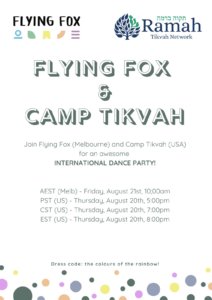When our Ramah camps decided not to open this summer, we worked hard to find ways to meet the needs of our community members—both within each camp, and on the national level, through National Ramah programming. On the camp level, there were Kabbalat Shabbat and Havdalah services, challah baking, Israeli dancing, yoga classes and more. On the national level, there were Rich Recht and Josh Washawsky concerts, learning sessions, Musical and Mindful Mincha, etc.
How would we provide virtual programming for campers with disabilities? As we polled our families through our Tikvah directors, we learned—to our delight—that community members with disabilities enjoyed participating in camp wide activities with their friends with and without disabilities. In fact, they were great consumers—arriving on time, participating regularly and enthusiastically. Campers with disabilities also enjoyed programs with fellow Tikvah Program members—like regular prayer and song sessions, and weekly video calls, known as Shabbos is Calling and Shavua Tov.
We learned that parents of participants in our vocational training programs worried their 18-26 (ish) year olds would feel isolated and lose hard and soft skills of employment if they were not engaged this summer. How could the National Ramah Tikvah Network help? Welcome to the 12-session Tikvah Virtual Vocational Training and Socializing Program! I wrote about this on July 2, at the start of the program. Here is a progress report!
Under the leadership of Maya Albin, and with the ongoing assistance of Rebecca Finkelstein, Rachel Arditi, Sarah Parkes—all experienced Tikvah staff members from various Ramah camps–and with the help of volunteers and Tikvah directors, we organized a twelve session program which met Tuesdays and Thursdays. We attracted 45 participants each session, from across four time zones.
When we designed the program, we planned sessions to address such topics as job skills and soft skills of a job; Thursdays sessions would involve a hands-on project, and we would hear from alum of our programs who would describe their current jobs, living situations, Jewish involvement and social lives. We also planned to have some time for socializing.
What we hadn’t anticipated is just HOW important this program would become in the lives of the participants and their families. The program offered reliability and predictability during uncertain times, it offered friendship and conversation during a summer when in-person socializing wasn’t possible. The program expanded the world of our participants. For example, worlds expanded when participants realized it was dark in Boston but still late afternoon in Sacramento! During socializing times, they shared news of birthdays, vacations, and pets. They talked about their own camp experiences and listened to the slightly different but very similar experiences in other Ramah camps. They sang Rad Hayom at the end of each session—a song we sing in all of our camps, with ever so slightly different edah (division) names!
In our final session three days ago, Talia said, “I can’t believe how fast it has gone by. It is crazy! Austin said, “I hope we can continue in the fall!” Participants had razor sharp memories for what we did in the previous 11 sessions. Zach liked learning about budgeting and self-advocacy. Maya liked folding clothes and learning about resumes. Carly liked the interviews with alum. For our last session, 50-year-old Matthew, an alum of Tikvah New England who was our guest in session 11, returned as a participant. Sydney enjoyed learning about money and Tiffany remembered learning about personal space.
While some group members have worked continuously through the pandemic (ie. Austin in a hospital, Tiffany and Matthew in grocery stores—and take great pride in being called “essential workers!”), others are still awaiting a return to in-person work. They have all kept both their soft and hard skills—and their social skills–sharp through participation in our virtual voc ed program.
As we were winding down our final session, Zach said, “It has been ha lot of fun. I hope you guys have an awesome rest of the summer and I hope to see you guys in the Fall!” Maya offered, “Thank you for the great program!” And Austin added, “It was very excellent, very fun and I am definitely giving you guys a great survey!”
We are reviewing the surveys and seeing just how much participants want to continue. Stay tuned as we consider ongoing programing for the fall. For now, we are planning a special evening this Thursday when we will be joining friends and colleagues from Flying Foxes, a program in Australia which provides socialization programs for people with disabilities. Check out our International Dance Party!



